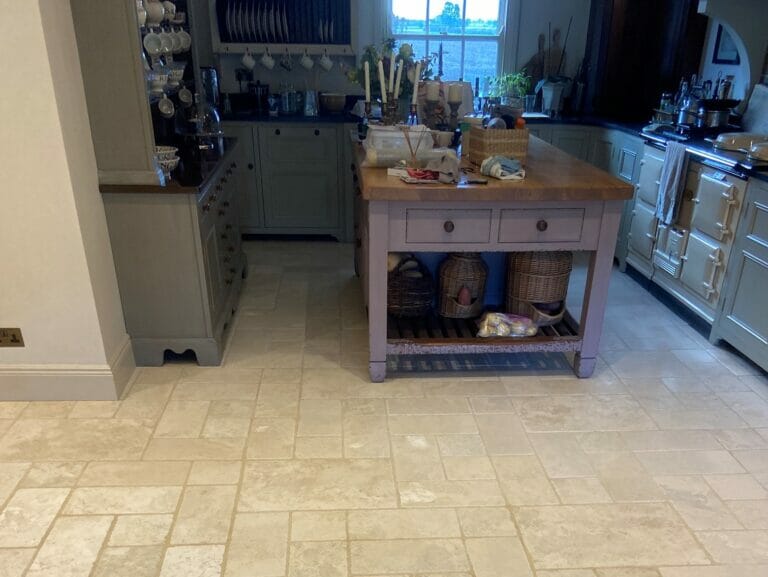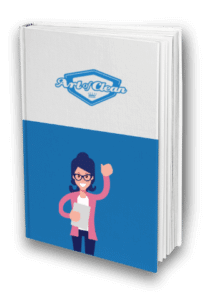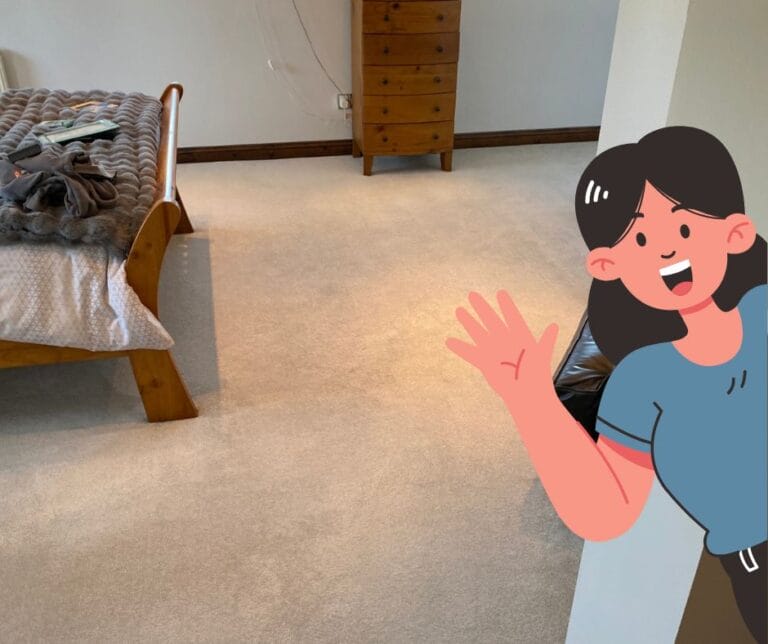This article will cover:
- What types of tiled floors are there?
- Description of each tile.
- What is the ideal flooring for my kitchen?
1. What types of tiled floors are there?
The typical natural stone floors we see are:
- Granite
- Travertine
- Marble
- Limestone
- Slate
The typical man-made floors we see are:
- Ceramic
- Quarry Tiles
- Terracotta
- Porcelain
- Cement
2. Description of each tile.
The most significant advantage to laying any stone flooring is its timeless beauty.
If laid correctly, with the right tile choice, the floor could last for 100 years +.
Remember, all stone flooring can be damaged if not sealed and maintained correctly.
Never use acidic solutions on your stone floor. For more about this, click here.
So, the natural stone floors are as follows:
-
Granite:
This stone floor is usually the better choice of all-natural stone floors. Its durability makes it one of the better tiles for a kitchen.
It’s less likely to scorch, scratch or etch (Etch- Damage to the tile from acidic substances and harsh cleaners).
Once sealed, it is less likely to show up stains too.
-
Travertine:
This stone is the sister stone to both limestone and marble.
Travertine can etch more than others, so we wouldn’t recommend this floor for a kitchen as it would need a lot of maintenance.
This tile is far better in a bathroom, toilet or living room. In rooms, you’re less likely to spill oils or other harsh substances that may stain it.
-
Marble:
I don’t recommend this for a kitchen as it is prone to etching and scratches.
With its luxuriously smooth texture and high gloss finish, this is a beautiful tile, usually found in a bathroom, to give it that spa-like feel.
Very much like travertine, it can be etched very quickly.
-
Limestone:
Though this is a beautiful and unique stone, it isn’t as popular as its sisters.
We would avoid using limestone in a kitchen as it’s much like its sisters and isn’t as durable as you would need.
-
Slate:
With its attractive appearance and durability, slate is another common one for the kitchen.
Slate can be durable and resistant to most chemicals and doesn’t scratch or chip. Be aware though there are extreme opposites with these tiles.
Sometimes slate that costs less can be chipped easily, and because of its colours and textures harder to match up to try and fix.
With its variety of colours, slate is very much a popular tile. Examples of colours are green, red, black, purple, and brown.
The man-made tiles are:
-
Ceramic:
These tiles tend to be very hard and long-lasting, so durability for a kitchen makes these good.
They tend to be waterproof, non-absorbent, and easy to clean.
-
Quarry Tiles:
These tiles sometimes get mistaken for terracotta due to the colour, but quarry tiles are made from coarse brick-like materials.
Quarry tiles are generally hard-wearing, perfect for any room, especially a kitchen.
-
Terracotta:
Now, the colour of these is the only thing that makes them very much like the Quarry tile.
The terracotta is made from potter clay which is more refined and smoother.
As durable as they are, terracotta tiles are used in many areas, even outdoors, oftenin a kitchen, hallway, or porch.
The terracotta tile is the way to go if you want a rustic look and feel.
-
Porcelain:
These tiles are hard-wearing and come in a variety of colours.
Porcelain is denser than ceramic and, therefore, a little more durable.
This tile is very suited to high footfall areas, which is also suitable for a kitchen.
-
Cement:
This is again a very durable tile, but due to being very porous would need to be adequately sealed once laid.
Its durability makes the cement tile perfect for a kitchen but it would need to be sealed due to the risk of spillage.
3. What is the best tile for my kitchen floor?
Now that you know about each tile, here’s my advice on which one is best for your kitchen:
- If you’re unsure what style you want and would like various choices, the best ones are porcelain.
- If you want something with a glossy, shiny and unique look, the Marble, limestone or travertine, but be aware these will need sealing exceptionally well and a lot of maintenance to keep looking good.
- If you want a rustic, farmhouse look, then the terracotta or quarry are the ones to pick. Again, maintenance will be more.
Remember that sealing is essential to anyone thinking about laying their floor themselves on most tiles.
Porcelain or ceramic tiles may not need sealing, but always see the manufacturer’s guide to avoiding further issues.
If the grout isn’t sealed correctly, you risk grime and water seeping in, leading to cracked tiles.
So, sealing the grout will lengthen the lifespan of your new tiled floor.
I can’t express this enough either, DO NOT clean your tiles with acidic solutions. For help finding a solution, please click here.
Want to make your stone floor shine again? Check out this article:
Learn how a professional will clean your stone/tiled floor… click on the link below:
 Written by Tracey Gilbey, Marketing and Admin Coordinator at Art of Clean.
Written by Tracey Gilbey, Marketing and Admin Coordinator at Art of Clean.
For further advice or information on our Carpet and Soft Furnishing care, please do not hesitate to contact the Art of Clean team on 01223 901551 in Cambridge. Our services include Carpet Cleaning, Upholstery Cleaning, oriental and area Rug Cleaning, Curtain Cleaning, Patio, and Driveway Pressure washing, Leather Cleaning, Stone and Tile Floor Cleaning, and Wood Floor Sanding and Restoration. We also supply new flooring and carpets through our sister company Art of Flooring. Our Dry-Cleaning service is provided by Farthings Cambridge






